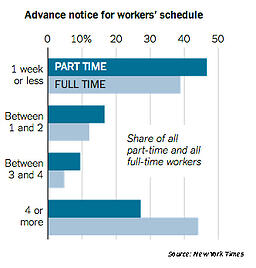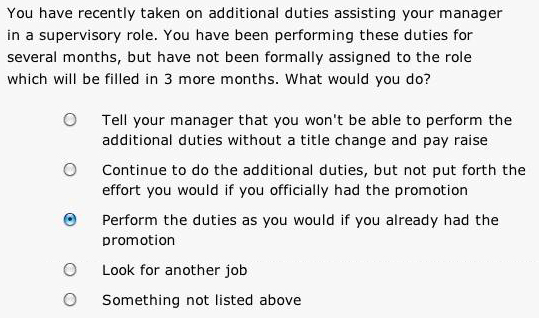Retail traffic is slowing.
The Container Store’s CEO recently said, “We’ve come to realize it’s more than just weather.”
Employees are demanding a higher minimum wage. And they’re winning in many large cities like Seattle. See my post on living wages.
You might be tempted to think less of those ungrateful workers.
You might think they should be happy they even have a job – even if it’s not what they went to school for.
If you’ve worked in retail for awhile like I have, you’ve heard all of this before, but there’s a disturbing trend happening across retailing … many larger retailers are expecting associates to give up their personal lives in order to be at the beck and call of their managers, and they are expecting them to live with wages that fluctuate week to week.
And it’s a trend that is growing…
No wonder I get comments on my blog like this one from a disgruntled clerk:
“…We are trampled by our managers, berated by the public, and can barely make ends meet at home. No wonder a lot of us succumb to substance abuse! It's demanding, unrealistic folks like the "expert" who wrote this article that drive us into the ground and force us [to] hide in the changing room, shaking from exhaustion, frustration, and utter misery. In the future, if you truly want us to care and help you find the holy grail of cheaply manufactured goods from China that you just can't seem to live without, then show some respect and empathy. Then you may get what you’re looking for. Until then? Well, we....just....don't....care.”
Wow! Where does such anger come from?
Look no further than this article in the New York Times, A Push For Steadier Shifts.
The article cites the Bureau of Labor Statistics and shows that 47% of part-time hourly workers receive their shift schedules with less than a week of advance notice.

That’s nearly half of all part-time workers!
Imagine being a dad and not knowing if you’ll be able to make your child’s birthday party until a day or two before. Or a mom trying to make sitter arrangements. Or a student trying to work two jobs to put themselves through school. Read their stories here.
Heck, imagine the manager who is charged daily to cut down each of their salespeople’s paychecks.
I know, pretty grim.
Managers, to stay within a scheduling budget based on foot traffic, have wide latitude to say who works and when. The same article stated that associates’ hours usually fluctuated between 17-28 hours per week.
That’s a wide variation.
This can lead to employees being told to go home soon after arriving. Others are told to call in for their shifts each day, while some show up for work and are told not to clock-in.
Employees, rightfully, have a problem with that…
And there’s more...
Some feel the deck is already stacked against them being able to make a decent living.
Look no further than this screenshot of an online employment application from a major retailer.

The implication from the selected answer, which you know is what they want, is that your manager has the right (and probably will) take advantage of you.
No wonder unions are excited and are pushing hard for higher wages, more stable shifts and overall better working conditions!
After all, unions were the ones who got a minimum wage, a forty-hour workweek and other benefits for workers in the first place.
As managers use Big Data via smart apps to decide who should work and who should go home in quarter-hour increments, look for scheduling to be the next big battle in labor relations.
Do you want a salesclerk like the disgruntled one I quoted above railing against you online?
I don’t think so.
You want to create an exceptional experience for your customers.
You want your foot traffic to increase.
You want to grow your business.
Then treat your sales crew with respect.
All the talk of creating an engaging atmosphere for shoppers falls flat when you undermine morale from the get-go with a flawed hiring process, by cutting hours on an ongoing and capricious basis, and expecting your team to be happy.
You need a stable crew who are able to work enough hours to embody your brand and who are confident that they will be able to pay their bills on the steady hours you give them.
What to do
- Make a schedule and post it two-weeks in advance.
- Have a process whereby employees can switch shifts with other associates on their own.
- Be flexible and balance your needs with your sales teams’ needs.
Managing down your payroll to the amount an app tells you will often result in managing down your sales.
In Sum
If you continue on a path of obedience to the scheduling budget gods, employees simply won’t show up, or quit… or worse, they will stay and give the worst service possible because they feel they are, as one LinkedIn commentator called them, “grunts.”
And based on the stories I’ve read recently, that’s exactly how they are being treated.

